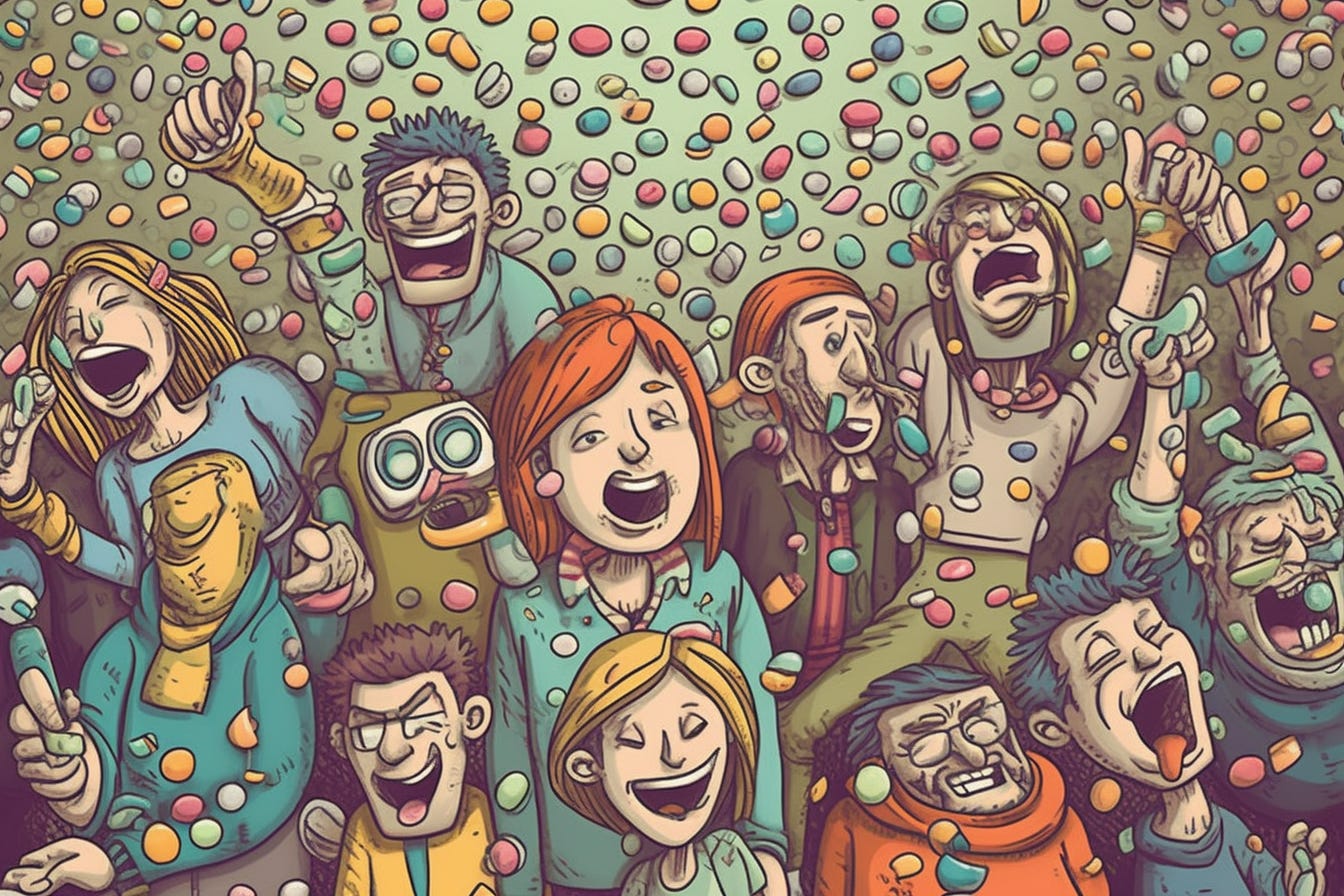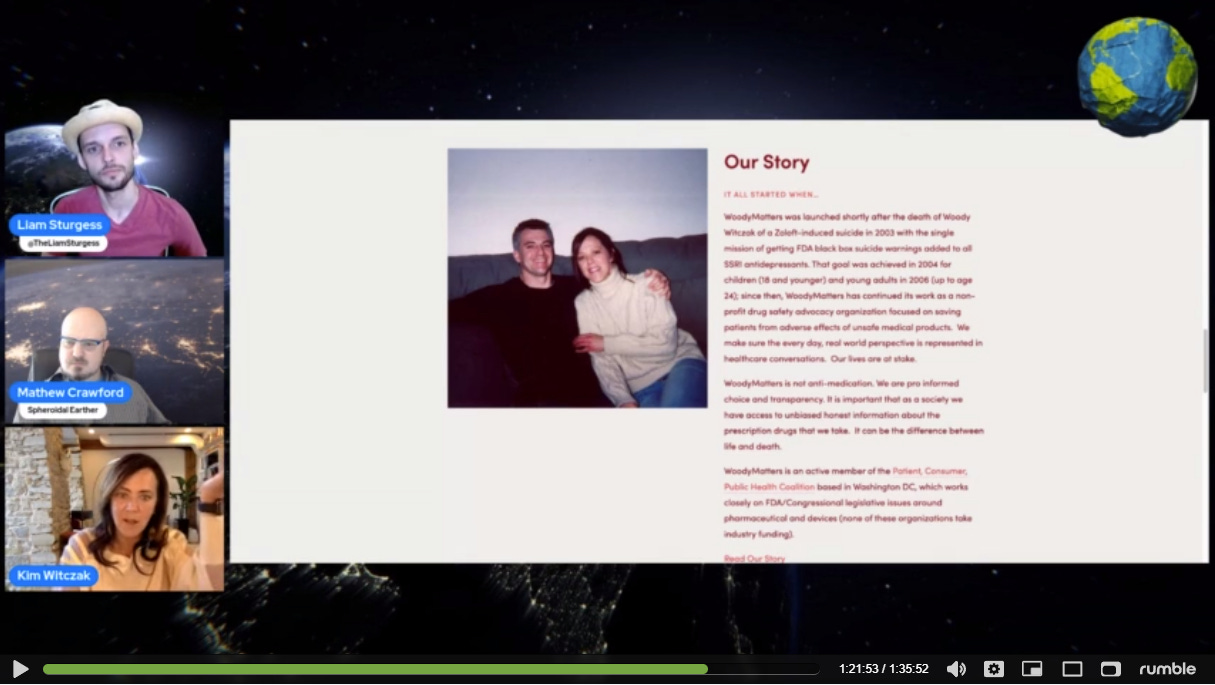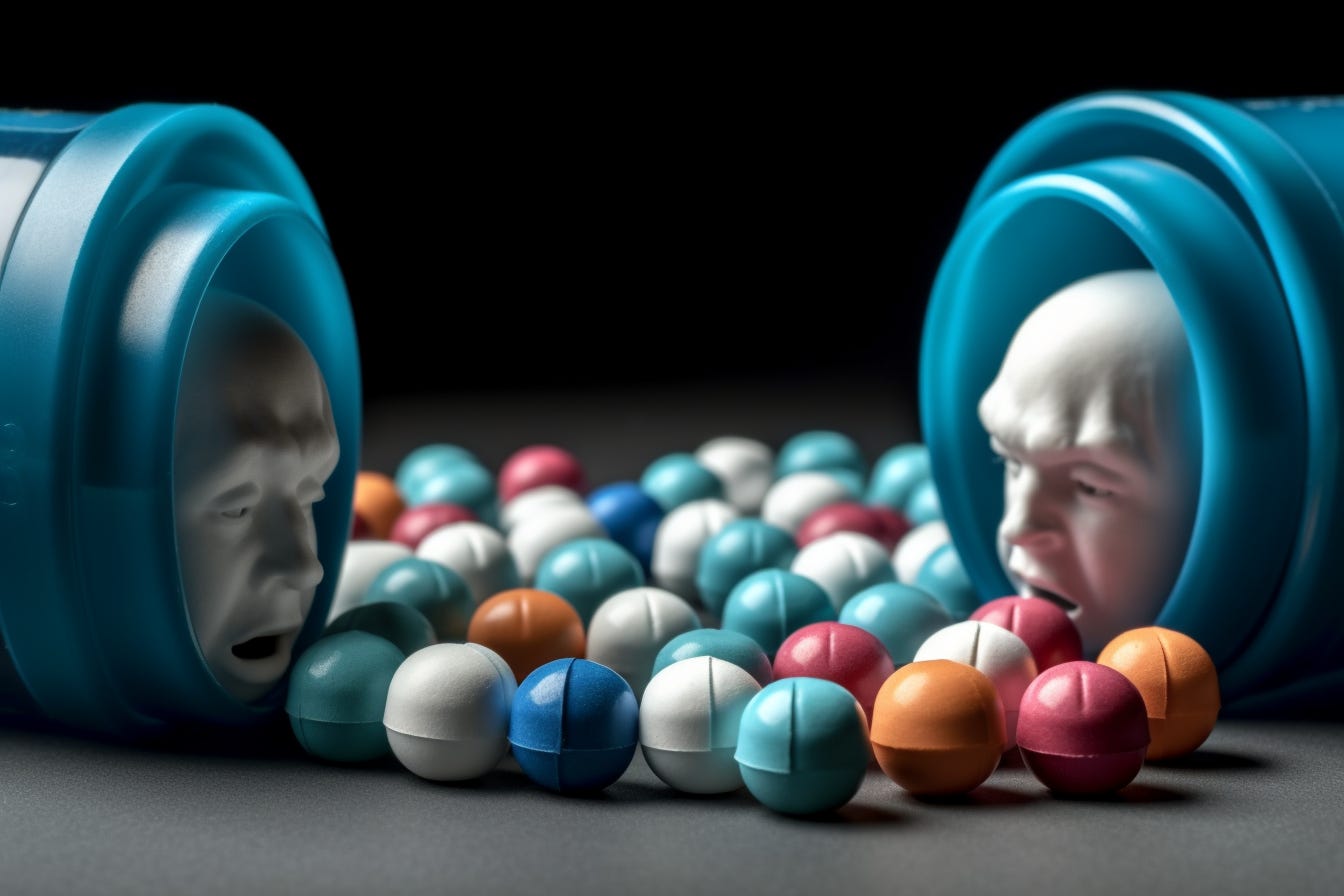Click here for more Healthcare Wars articles. Further discussions are common at the Rounding the Earth Locals channel.
Looking back on life, I feel fortunate to have grown up in a circle of rebels (punks?) who were scathingly skeptical of many of the Molochian features of society. We often used humor competitively (in the internal group sense) to strip away layers of bullpfizer that laid the absurdities of society bare. References to the overconsumption of "happy pills" were not uncommon, and many a school teacher saw us as the worst form of degenerates.
There are worse kinds of punks. We were…mostly harmless.
It is a fact that repetition of jokes works like self-programming mantras. At least mostly. Though I have generally stood back from pharmacological solutions to most health problems (I do take a pain medicine when I need it, and you can pry my pseudofed out of my cold dead hands when I'm in the wrong locale during pollen season), I briefly made a single exception. During a rough stretch in 1999 that I would describe as mild, but prolonged depression during which I was constantly learning about and handling the many criminal acts of my brothers (which ranged from selling drugs for a government-associated mafia family to theft to physical abuse and assaults of others, and were weirdly encouraged by our parents), I sought out a psychiatrist. On day one she prescribed me zoloft, and I took the prescription without doing a great deal of research.
Today, millions of Americans take zoloft, and for a variety of reasons. If that isn't enough to make you scratch your head, the effects of zoloft seem to be wildly different for every person I've ever talked to about the drug. For me, there was a single day of mania (which I now recognize as that feeling/state is entirely unique to anything I've ever felt or experienced), and then weeks (three or four months, IIRC) during which I could not tell the difference in my emotional state at all. The psychiatrist seemed otherwise entirely unhelpful, so I stopped appointments, and committed to stopping the drug.
Stopping taking even a low dose of zoloft turned out to be a "painful" experience. I put painful in quotes because it was not so much that I felt pain in the standard sense, but that I experienced "the zaps". Luckily for me, during the time I handled the zaps, I quit my job and successfully transitioned away from hedge fund work to trading stock options from home, so I got a lot more exercise throughout my day. While I don't know for certain that the exercise helped, it almost never hurts. I also lost weight and put on muscle that year, which is its own antidepressant.
Around a month ago, I found out that my podcast producer and sometimes cohost, Liam Sturgess, also went on zoloft. You can hear his story in the podcast link below.
Three weeks ago, Liam Sturgess and I had the good fortune to host Kim Witczak, the "Accidental Advocate". Though Kim's story begins with a tragic event–the suicide of her otherwise happy and healthy husband soon after he began a course of zoloft, prescribed to him when he suffered insomnia associated with a new job, our conversation with her felt joyful because she turned her personal tragedy into a meaningful mission.
Though I had learned about some of the dangers of the overuse of SSRIs and other mind-altering medications over the past 20-something years since my own experience (including the stark relationship between antidepressants and mass shootings), the Plandemonium has brought me into closer contact with the full array of potential harms of these medications. While I'm not ready to say, "nobody should ever take these," I'm also not certain that most anyone should take some of them.
If you do not usually click on my interview links, I stress that the one above is one of the best conversations we have had on Rounding the Earth. Not only is Kim a practiced educator on the topic, but she was fluid enough in conversation for us to relate the topic to a broad array of societal problems. Now, I would like to take this conversation in a different direction…
What if Popping Pills for Depression Suppresses Understanding of Societal Decay?
"God, grant me the serenity to accept the things I cannot change,
courage to change the things I can,
and wisdom to know the difference." -The Serenity Prayer
We look at depression all wrong. And in a number of ways.
Chris Martenson and I share the view that the broad psychological warfare that seems to be consistently aimed at society seeks to sap us like "Rats in a Cage" with reference to the Rat Park studies conducted by Bruce Alexander and colleagues more than forty years ago. This takes place through a combination of media confusion, economic control, and is set up through years of the lobotomizing influence of the educational system.
Otherwise, the largest variables associated with depression may literally be dehydration, poor diet, and lack of consistent exercise.
But I don't want to oversimplify the problem. We do in fact live in a unique moment in history—to list all the reasons why would take its own article. The result is a pile of difficult-to-identify-and-handle stressors. According to the World Health Organization, sometime prior to 2017, depression became the number one cause of disability worldwide. How did that come to be?
Research into stress-related psychiatric disorders reveals epigenetic stress triggers govern the general mood change (Klengel and Binder, 2015). Some people have versions of genes that resist the protective mechanism of "temporary shut down for healing" that might describe most depression. It may be that there is a game theory to having some members of the tribe/community become depressed during or after certain events in order to signal that society has veered into an unhealthy direction. It is noteworthy that we find the scattering of such gene isoforms responsible for the divergence of behavioral states all 'round the Earth.
This is no accident. And it is no accident that depression rates skyrocketed over the past 60+ years in the wealthiest nations—right around the time that Douglas Murray details as the era during which American society split into more distinct classes. And people's brains and bodies started to signal that something was wrong.
Something is wrong.
A second wave of rapidly increasing anxiety and depressive disorders hit us at around the time the iPhone was introduced and the mortgage bond bubble collapsed into the banking crisis [around which weighty and confusing government systems began pivoting rapidly, spiraling toward World War E]. This time, teens—and girls in particular—are feeling the greatest levels of increasing stress. Too many young people are spiraling out of control.
And that was before a pandemic was declared, lockdowns instituted, and children were glued to computer screens at home with sudden and subpar educational guidance.
At some point, we must meditate realistically on the signals. This is a sad problem. This may be a Pharmafia problem, but this is not a happy pill problem. This is a societal problem. This all happened along with the sorting of the classes. This all happened along with the centralization of the purse strings that controlled the direction and asymmetric control over the direction of technology. This is Molochian.
That may not be a solution, but we must first identify the problem.
Addendum: Via Kim Witczak via Dr. Pierre Kory, from a Midwestern Doctor:









I completely agree.
I have spent most of my career doing academic research on depression and anxiety. I would move heaven and earth to stop any loved ones of mine from taking antidepressants.
I interviewed primary healthcare physicians about antidepressants once. I said "Has any patient ever returned to the surgery after you prescribed antidepressants and told you that they work well?" They all thought for a second and said, "Actually, no."
I also asked the physicians how they think antidepressants work. None of them had a cogent answer.
They told me that they prescribe antidepressants because the waiting list for therapy is over a year long (I am in the UK) and they don't know what else to do with desperate people who come to them for help.
Agree 💯. When you learn to respect and pay attention to depression and pain as valuable signals in order to correct course, you'll never want to quiet it with medication of any sort again. Even small amounts of alcohol, cigs, etc can be dulling the pain you would otherwise be motivated to find relief from by realigning your life, purpose, relationships etc.